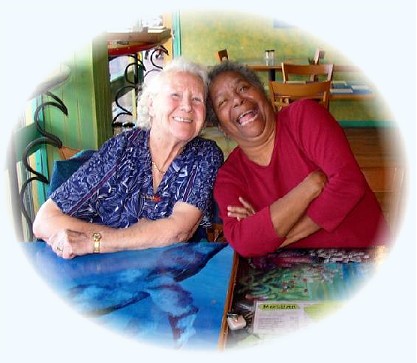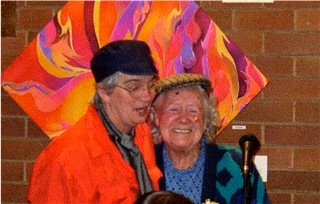Rose Anchell 1916-2010
The Revd Rebecca Newland's sermon at Rose's funeral is here. (pdf)
Eulogy at Rose's funeral, by her daughter-in-law, the Revd Linda Anchell
 Rose was born on 8 February 1916 within the sound of Bow Bells, in Homerton, in London's East End—a true Cockney. It was the eighth of the second, 1916; a fact that she remembered to her dying day. The youngest of a family of five children, it was probably her father who called her "the last rose of summer" (and, Mum used to add: "and still blooming!"). Her mother, very sternly, told the other children who called her 'fatty' that "Her name is Rose!".
Rose was born on 8 February 1916 within the sound of Bow Bells, in Homerton, in London's East End—a true Cockney. It was the eighth of the second, 1916; a fact that she remembered to her dying day. The youngest of a family of five children, it was probably her father who called her "the last rose of summer" (and, Mum used to add: "and still blooming!"). Her mother, very sternly, told the other children who called her 'fatty' that "Her name is Rose!".
A childhood with Salvation Army Sunday School, jumping over balustrades, and, if it wasn't just an older imagination, sliding down banisters, set her up to be the wonderful cockney that she was.
But life was not to be a straight forward, simple, affair. A Londoner born in 1916 had much to contend with. Poverty and war were facts of life. Rose managed a hair perm twice a year and swimming too! (Swimming lessons did get you out of school!) She won a medal in a works swimming carnival in 1932 at the Oglethorpe Bowl (but neglected to teach her son to swim!).
In 1939, Rose East married Fred Anchell of the Rifle Brigade, at the Hackney Registry office. The photos were taken in front of the protective sandbags.
Rose went into the Land Army. The London factory worker was, it would seem, rather unwilling. But driving a tractor into a ditch meant returning to London (and the bombs).
Fred returned after gallant service in Calais (and a dunking in the channel) then left for North Africa where he became a prisoner of war for the remainder of the hostilities.
Rose was evacuated to Hertfordshire to give birth to her first son, Fred (or Freddie) and again, quickly returned to London. In 1946 Rodney was born, but after many medical problems he died in 1948. A grief shared with few.
Rose worked in factories: stitching cheque books; Berger's Paints, The Metal Box factory; many and various places.
A move from Walthamstow (London) to Kent — Davis Estate in Chatham — meant work at Rochester airport industrial area and Foster Clark's canning factory and the Sharps Toffee Factory in Maidstone, Kent.
Fred (senior) was struggling with bronchitis stirred up by the war. In 1961 the family set sail on the Arcadia to Australia. (Rose was over forty.) Adelaide was the destination. Young Fred found his feet in Melbourne. But Rose and Fred senior were unsettled and returned to England. To find work, they went to Rose's eldest brother in South Africa. That was a difficult time.
One thing that should be said about Rose is that she noticed people. She loved company and did not recognise social boundaries, especially not racial ones. Apartheid era South Africa was not an easy place to be.
Young Fred had by now become an Australian. So they returned to Australia and found work in Victoria as gardener and cook/housekeeper at various Western District farming properties, cooking for jackaroos and neighbours.
One dinner party guest asked who had cooked the meal, then went in to the kitchen to thank the cook. It was the then Prime Minister, Malcolm Fraser (who owns a property in the Western District).
As Fred's emphysema worsened, they took work in Melbourne, at the Walter and Eliza Hall institute. Here Rose was "bottle washer" for Sir Gustav Nossel.
Retirement came in Geelong with Rose nursing Fred until his death in 1986.
 She was then in the RSL Village and a good neighbour to all. In the late 1990's Rose realised that she needed to move closer to Fred and Linda near Queanbeyan. She found the Legacy Village units and arranged to move.
She was then in the RSL Village and a good neighbour to all. In the late 1990's Rose realised that she needed to move closer to Fred and Linda near Queanbeyan. She found the Legacy Village units and arranged to move.
So Rose came to Queanbeyan. She continued to enjoy cruising, including cruises on the QEII amongst others. She visited relatives in Ireland and travelled the world on her own or with (young) Fred. She joined in the social life of Legacy village; walked into town to the Chinese bakery and the icecreamery and connected with St Philip's in O'Connor.
But on her last cruise to New Zealand, things were not right. Mum came back with flu, saw a gerontologist and was diagnosed with dementia. It had come on late in life and she was independent for a few more years. Eventually there was the need for assisted living at George Forbes House.
Here Rose's cockney humour came to the fore. To enquiries about her health. "How are you?", "All right", is the answer, "all down one side" (with right hand swinging downwards).
"What do you want on your sandwich today?" asks Chris. "A man!" is the reply.
Rose, you never did find that millionaire at the club! Sorry.
PS. I forgot one important event in Rose's life. She kissed the Blarney Stone! (in her late seventies or eighties). She would definitely have slid down banisters. I was not definite enough about that in the eulogy!"